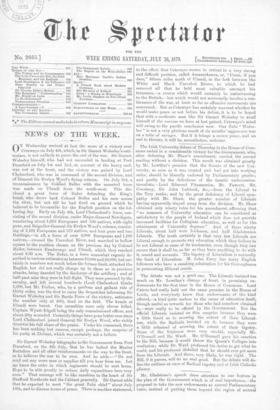Sir Garnet Wolseley telegraphs to the Government from Port Durnford,
on the 8th July, that he has halted the Marine Battalion and all other reinforcements on the way to the front, as he believes the war to be over. And he adds :—" Do not send out any more men or supplies till you hear from me, Let me know the order in which regiments should be sent home. Hope to be able greatly to reduce daily expenditure here very soon." That message will be like Sunshine to the heart of Sir Stafford Northcote and the Cabinet generally. Sir Garnet adds that he expected to meet "the great Zulu chief" about July 16th, and to discuss terms of peace. There is another statement, to the effect that Cetewayo means to retreat to a very strong and difficult position, called Amanzekanza, or, "Come, if you dare," fifteen miles north of Ulundi, in the fork between the White and Black Umvolosi Rivers, to which he had removed all that he held most valuable amongst his treasures,—a course which would certainly be embarrassing to the British,—but which would not necessarily involve a con- tinuance of the war, at least so far as offensive movements are concerned. • But as Cetewayo has certainly wavered whether he would make peace or not before his defeat, it is to be hoped that with a moderate man like Sir Garnet Wolseley to avail himself of the success we have at last gained, Cetewayo's mind will swing to the pacific conclusion now. Our Zulu " Water- loo " is not a very glorious result of six months' aggressive war on a tribe of savages. But if it brings a secure peace, and an end to threats, it will be, nevertheless, welcome.


































